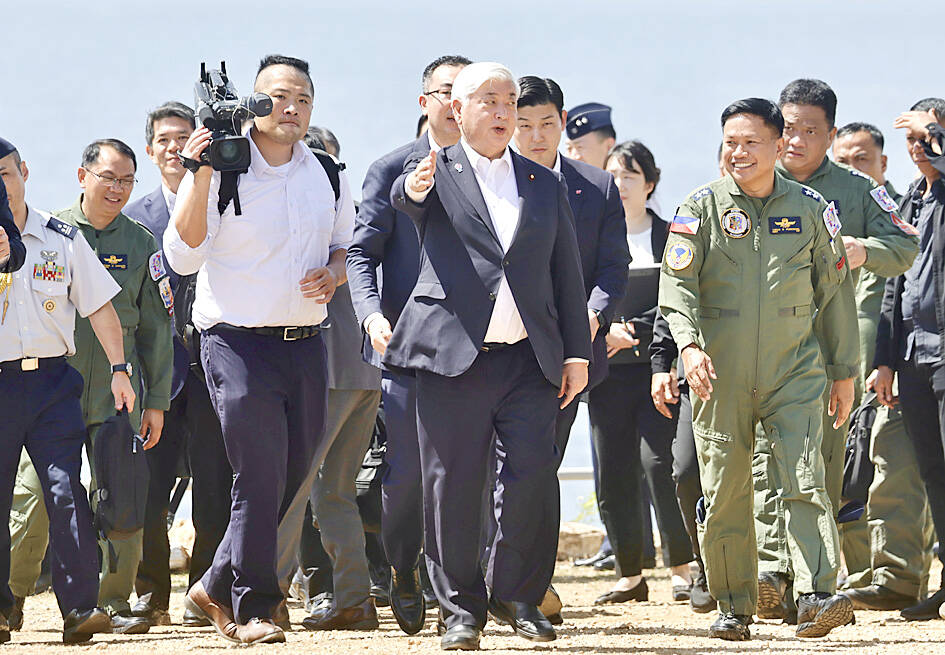France’s nuclear-powered aircraft carrier and accompanying warships were in the Philippines yesterday after holding combat drills with Philippine forces in the disputed South China Sea in a show of firepower that would likely antagonize China.
The Charles de Gaulle on Friday docked at Subic Bay, a former US naval base northwest of Manila, for a break after more than two months of deployment in the Indo-Pacific region.
The French carrier engaged with security allies for contingency readiness and to promote regional security, including with Philippine forces, navy ships and fighter jets.

Photo: AFP
They held anti-submarine warfare drills and aerial combat training on Friday in the South China Sea, Philippine and French officials said.
Last year, the French navy deployed a frigate for the first time to participate in a joint sail with the US and the Philippines in and near the disputed waters.
It was part of the largest annual combat exercises in years by US and Philippine allied forces. The drills, known as Balikatan (Tagalog for “shoulder-to-shoulder”), involved more than 16,000 military personnel.

Photo: EPA-EFE
China strongly criticized the exercises then, saying the Philippines was “ganging up” with countries from outside Asia in an obvious reference to the US and its security partners, adding that the drills could instigate confrontation and undermine regional stability.
France’s recent and ongoing military deployments to the Philippines underscore its “commitment to regional security and the shared goal of strengthening maritime cooperation in the Indo-Pacific,” Armed Forces of the Philippines public affairs head Colonel Xerxes Trinidad said.
The Charles de Gaulle, the only nuclear-powered aircraft carrier in the world other than those of the US Navy, led a strike group that included three destroyer warships and an oil replenishment vessel in its first-ever visit to the Philippines, French officials said.
France has been shoring up its military engagements with the Philippines and other Southeast Asian nations at odds with China in the disputed waters, a key global trade and security route, although it says that those emergency-preparedness actions were not aimed at any particular country.
China has bristled at any presence of foreign forces, especially the US military and its allies, which carry out war drills or patrols in the South China Sea, which Beijing claims almost in its entirety. Its claims overlap with those of Taiwan, the Philippines, Vietnam, Malaysia and Brunei.
Meanwhile, Japanese Minister of Defense Gen Nakatani yesterday visited military installations on the main island of Luzon with Philippine Secretary of National Defense Gilberto Teodoro.
The Philippine News Agency reported that Nakatani and Teodoro discussed bolstering their nations’ strategic defense cooperation, particularly on maritime and air defense, and regional security initiatives.
The pair are to have an in-depth meeting today, and Nakatani is also to meet with Philippine President Ferdinand Marcos Jr, the agency said.
Additional reporting by staff writer

CHAOS: Iranians took to the streets playing celebratory music after reports of Khamenei’s death on Saturday, while mourners also gathered in Tehran yesterday Iranian Supreme Leader Ayatollah Ali Khamenei was killed in a major attack on Iran launched by Israel and the US, throwing the future of the Islamic republic into doubt and raising the risk of regional instability. Iranian state television and the state-run IRNA news agency announced the 86-year-old’s death early yesterday. US President Donald Trump said it gave Iranians their “greatest chance” to “take back” their country. The announcements came after a joint US and Israeli aerial bombardment that targeted Iranian military and governmental sites. Trump said the “heavy and pinpoint bombing” would continue through the week or as long

TRUST: The KMT said it respected the US’ timing and considerations, and hoped it would continue to honor its commitments to helping Taiwan bolster its defenses and deterrence US President Donald Trump is delaying a multibillion-dollar arms sale to Taiwan to ensure his visit to Beijing is successful, a New York Times report said. The weapons sales package has stalled in the US Department of State, the report said, citing US officials it did not identify. The White House has told agencies not to push forward ahead of Trump’s meeting with Chinese President Xi Jinping (習近平), it said. The two last month held a phone call to discuss trade and geopolitical flashpoints ahead of the summit. Xi raised the Taiwan issue and urged the US to handle arms sales to

State-run CPC Corp, Taiwan (CPC, 台灣中油) yesterday said that it had confirmed on Saturday night with its liquefied natural gas (LNG) and crude oil suppliers that shipments are proceeding as scheduled and that domestic supplies remain unaffected. The CPC yesterday announced the gasoline and diesel prices will rise by NT$0.2 and NT$0.4 per liter, respectively, starting Monday, citing Middle East tensions and blizzards in the eastern United States. CPC also iterated it has been reducing the proportion of crude oil imports from the Middle East and diversifying its supply sources in the past few years in response to geopolitical risks, expanding

Pro-democracy media tycoon Jimmy Lai’s (黎智英) fraud conviction and prison sentence were yesterday overturned by a Hong Kong court, in a surprise legal decision that comes soon after Lai was jailed for 20 years on a separate national security charge. Judges Jeremy Poon (潘兆初), Anthea Pang (彭寶琴) and Derek Pang (彭偉昌) said in the judgement that they allowed the appeal from Lai, and another defendant in the case, to proceed, as a lower court judge had “erred.” “The Court of Appeal gave them leave to appeal against their conviction, allowed their appeals, quashed the convictions and set aside the sentences,” the judges